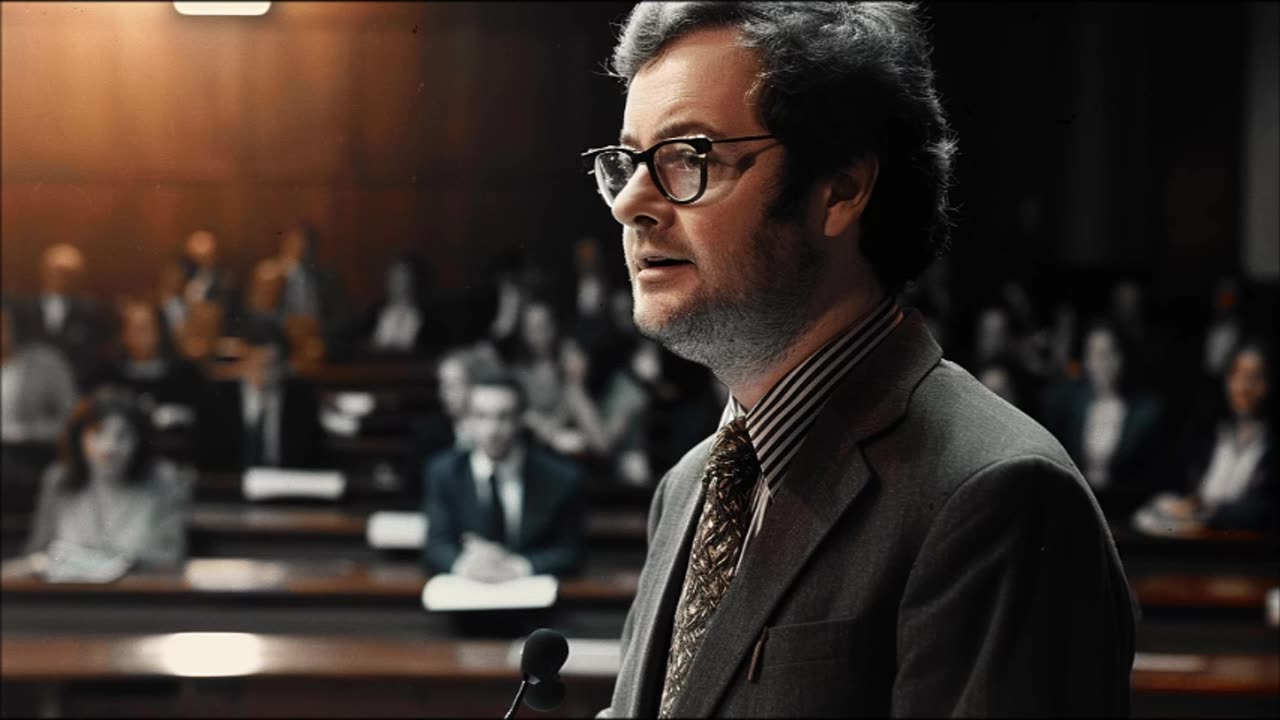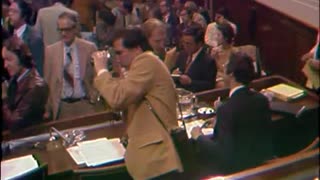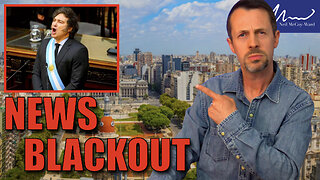Premium Only Content

The "Sick Fantasies" of the CIA and the Cult of Intelligence: The First Book Censored by the CIA
Read more about the CIA: https://thememoryhole.substack.com/
Victor Marchetti was a former special assistant to the Deputy Director of the Central Intelligence Agency (CIA) and an author known for his critical stance on the agency. After working at the CIA for over a decade, he became increasingly disillusioned with its operations and policies. This disillusionment led him to resign in 1969 and later co-author a book titled The CIA and the Cult of Intelligence with John D. Marks, which was published in 1974.
The book is a critical exposé of the CIA's activities, focusing on what Marchetti and Marks saw as the agency's excessive secrecy, its involvement in covert operations, and its influence on U.S. foreign policy. It was one of the first books to provide a detailed inside look at the inner workings of the CIA and to question its impact on American democracy and international relations.
Secrecy and Accountability:
The book argues that the CIA operates with a level of secrecy that is dangerous to democratic accountability. Marchetti and Marks suggest that this secrecy allows the agency to conduct operations without adequate oversight from Congress or the public.
Covert Operations:
Marchetti and Marks describe various covert operations undertaken by the CIA, including attempts to influence foreign governments, conduct psychological warfare, and engage in paramilitary activities. They criticize these operations for often being morally and ethically dubious, and for sometimes having unintended and harmful consequences.
Manipulation of Intelligence:
The authors discuss how the CIA manipulates intelligence to serve its own ends or the political goals of the administration in power. This manipulation can lead to misinformation and misguided policies.
Influence on Foreign Policy:
The book highlights the significant influence the CIA has on U.S. foreign policy, often acting as a clandestine arm of the government that can shape international events in ways that are not always in line with the publicly stated values and interests of the United States.
The CIA and the Cult of Intelligence is notable not only for its content but also for the legal battles it sparked. Before its publication, the CIA demanded that numerous passages be deleted or altered, citing national security concerns. Marchetti and Marks fought these demands, but ultimately, many parts of the book were censored. The final version contains blank spaces where the CIA's redactions were made, highlighting the extent of the agency's intervention.
The publication of the book, despite the censorship, was a significant moment in the debate over the CIA's role and the balance between national security and transparency. It contributed to a broader public and congressional scrutiny of intelligence agencies during the 1970s, leading to reforms and greater oversight, such as the establishment of the Senate Select Committee on Intelligence.
Victor Leo Marchetti Jr. (December 23, 1929 – October 19, 2018)[1] was a special assistant to the Deputy Director of the Central Intelligence Agency who later became a prominent critic of the United States Intelligence Community and the Israel lobby in the United States.[2]
Early life and background
Marchetti was born in Hazleton, Pennsylvania.[3] From 1951 to 1953, he served as a corporal in U.S. Army Intelligence in France and Germany.[4] Returning to the United States after his military service, he enrolled in Pennsylvania State University, where he majored in Russian area studies, graduating with a bachelor's degree in history in 1955.[4]
CIA career
External audio
audio icon "Looking at the CIA." Interview by Tim McGovern. KPFK (April 27, 1974). Los Angeles: Pacifica Radio Archives. PRA BC2043.
audio icon "Intelligence Service." Interview by Tim McGovern. KPFK (1977). Los Angeles: Pacifica Radio Archives. PRA KZ0390.
After a few months working as an analyst at the National Security Agency, Marchetti joined the CIA in October 1955.[4] He began his career as an analyst in the Office of Research and Reports, eventually serving a tour of duty in the Office of National Estimates (ONE).[5]
From ONE, Marchetti moved to the Office of Planning, Programming, and Budgeting in 1966, where he worked for over two years.[5] Beginning in July 1968, he served for nine months as special assistant to CIA Deputy Director Rufus Taylor.[5] His final position in the Agency was on the Planning, Programming, and Budget Staff of the National Photographic Interpretation Center.[5] Among other projects with which he was involved, Marchetti worked on setting up the Pine Gap satellite ground station near Alice Springs in Central Australia.[6]
In September 1969, Marchetti resigned from the CIA.[5]
Writing career
After leaving the CIA, Marchetti began a writing career. His first work was a novel, The Rope-Dancer, published in 1971. The plot involves an officer in the "National Intelligence Agency" who becomes a spy for the Soviet Union.[7] In a 2004 article for American Intelligence Journal, Jon Wiant, career member of the Department of State's Senior Executive Service and a faculty member of the Joint Military Intelligence College, reported a 1991 conversion with retired KGB General Oleg Kalugin in which the latter told him that Rope Dancer is assigned as required reading for every KGB officer assigned to the United States.[8] Kalugin believed the novel was an excellent primer in American counterintelligence doctrine.[8]
External audio
audio icon "The CIA and Dirty Tricks." Interview by Robert Kuttner on WBAI (February 21, 1972). Los Angeles: Pacifica Radio Archives, with CovertAction Magazine.
audio icon The Internal Danger: Uncovering Covert CIA Activities (1975), with William Colby, John D. Marks, Bella Abzug, Phillip Agee. Los Angeles: Pacifica Radio Archives. PRA KZ1146.01.
During public appearances promoting the novel, Marchetti announced that he was writing a non-fiction work about the CIA. In March 1972, he completed a draft of an article for Esquire which, according to a later CIA account, included "names of agents, relations with named governments, and identifying details of ongoing operations."[5] The CIA received a copy of the article and decided to seek an injunction against its publication.[5]
The basis for seeking an injunction against Marchetti was the secrecy agreement which he had signed when beginning employment at the CIA. The CIA presented the agreement and the parts of the draft article it considered in violation of the agreement, to Judge Albert V. Bryan, Jr. of the US District Court for Eastern Virginia, who granted a temporary restraining order in April 1972. The case proceeded to trial, at which Bryan found for the CIA and issued a permanent injunction requiring Marchetti to submit his writings to CIA for review prior to publication.[9]
Marchetti appealed the injunction to the Fourth Circuit Court of Appeals, which upheld Bryan's restraint but limited it to classified material. The appeals court also found that Marchetti was entitled to timely review of materials he submitted to the CIA.[10] Marchetti appealed again to the US Supreme Court, but the Court rejected Marchetti's appeal in December 1972.[11]
Marchetti continued work on his book with a co-author, John D. Marks, and signed a book contract with publisher Alfred A. Knopf. In August 1973, they submitted their manuscript to the CIA.[12] After reviewing the manuscript, the Agency responded with a list of 339 passages which it claimed contained classified information and demanded their deletion.[12] Marchetti and Marks rejected the demand and indicated they would go to court in order to print the manuscript as written. The CIA then withdrew its objections to 171 of the items but stood firm on the remaining 168.[13]
The trial was held again before Judge Bryan. This time, however, he rejected all but 26 of the deletions requested by the CIA on the grounds that the information in them was not properly or provably classified. The CIA appealed Bryan's ruling, and ultimately the Fourth Circuit Court of Appeals upheld all 168 of the deletions.[14]
The book was published by Knopf in 1974 as The CIA and the Cult of Intelligence.[15] It was printed with blanks for deleted passages and boldface type for the 171 deletions which CIA originally requested and later withdrew.[16]
Later writing
In 1978, Marchetti published an article about the JFK assassination in the far-right newspaper of the antisemitic[17] Liberty Lobby, The Spotlight. Marchetti, a proponent of the organized crime and the CIA conspiracy theory, claimed that the House Select Committee on Assassinations revealed a CIA memo from 1966 that named E. Howard Hunt, Frank Sturgis and Gerry Patrick Hemming in the JFK assassination. Marchetti also claimed that Marita Lorenz offered sworn testimony to confirm this. The HSCA reported that it had not received such a memo and rejected theories that Hunt was involved in a plot to kill Kennedy.[18]
In 1981, Hunt sued the Liberty Lobby and Marchetti for defamation and won $650,000 in damages. Liberty Lobby, represented by attorney Mark Lane, appealed the verdict. On February 1, 1985, Marchetti stated that key parts of his articles were based upon rumors that he heard from Penthouse columnist Bill Corson and that he had no corroboration of Corson's story.[18] Corson had provided an earlier deposition stating that he not discussed the rumors with Marchetti.[18] Marchetti and Liberty Lobby won the appeal in 1985.[19] Commenting afterward, two jurors rejected that the conspiracy theories offered by Lane influenced the verdict.[19] Lane's 1991 book Plausible Denial, develops the claims he presented in the trial.
In 1989, Marchetti presented a paper on the CIA at the Ninth International Revisionist Conference held by the Holocaust denial organisation Institute for Historical Review (IHR).[2]
Marchetti edited the New American View newsletter,[20] which described its aim as to "document for patriotic Americans... the excess of pro-Israelism, which warps the news we see and hear from our media, cows our Congress into submission, and has already cost us hundreds of innocent, young Americans in Lebanon and elsewhere."[2] He also co-published the Zionist Watch newsletter with Mark Lane, and published ADL and Zionism, by Paul Goldstein and Jeffrey Steinberg, who were both closely associated with the LaRouche movement.[2][21]
Personal life and death
[icon]
This section needs expansion. You can help by adding to it. (September 2019)
Marchetti suffered from dementia in his last years. He died at his home in Ashburn, Virginia at the age of 88 on October 19, 2018.[22]
Filmography
Inside Pine Gap (1997)
Inside the CIA: On Company Business (1980)
The JFK Conspiracy: Final Analysis (1992)
"You Have Used Me as a Fish Long Enough" (Part 2). The Living Dead: Three Films About the Power of the Past (1995). The second major television documentary series by British filmmaker Adam Curtis for the BBC. The series examines the manipulation of history and memory (both national and individual) by politicians and others.
Extract of Marchetti discussing Acoustic Kitty. 1 min.
Publications
Articles
"CIA: The President's Loyal Tool." The Nation, vol. 214, no. 14 (Apr. 3, 1972), pp. 430–432.
"Inside the CIA: The Clandestine Mentality," with John D. Marks. Ramparts Magazine (Jul. 1974), pp. 21-25, 48, 50, 52.
"Twilight of the Spooks." Inquiry (July 10, 1978), pp. 6–8.
"CIA to Admit Hunt Involvement in Kennedy Slaying." Spotlight (Aug. 14, 1978).
"How the CIA Views the UFO Phenomenon." Second Look, vol. 1, no. 7 (May 1979), pp. 2–7.
Republished in the Journal of Historical Review, vol. 17, no. 5 (Sep./Oct. 1998), p. 14.
Books
The Rope-Dancer. New York: Grosset & Dunlap (1971). ISBN 0448024608, 978-0448024608. OCLC 159470.
The CIA and the Cult of Intelligence, with John D. Marks. New York: Knopf (1974). ISBN 978-0394482392.
Book reviews
"Memoirs of a Frustrated Spook." Review of Decent Interval: An Insider's Account of Saigon's Indecent End Told by the CIA's Chief Strategy Analyst in Vietnam by Frank Snepp. Inquiry (Feb. 6, 1978), pp. 22–24.
"A Sand Trap for the CIA." Review of Ropes of Sand by Wilbur Crane Eveland. Inquiry (Nov. 10, 1980), pp. 23–24.
Republished: Journal of Historical Review, vol. 14, no. 3 (May-Jun. 1994), p. 43.
Interviews
Kondracke, Morton. Penthouse (January 1975).
Castleman, Michael. "I Was a Spook for the CIA: A Conversation with Victor Marchetti." Ann Arbor Sun, vol. 3, no. 9 (April 25, 1975), pp. 15, 21. JSTOR community.28032710. full issue.
Newsletters
New American Views (as editor). Washington, D.C. (1988–). OCLC 20463595.
"Monitoring the special relationship between the United States and Israel."
Zionist Watch (as co-publisher, with Mark Lane).
Transcripts
"Propaganda and Disinformation: How the CIA Manufactures History." Presented at the Ninth International Revisionist Conference in Huntington Beach, California, hosted by the Institute for Historical Review (February 1989).
Republished in the Journal of Historical Review, vol. 9, no. 3 (Fall 1989), pp. 305–320.
See also
Philip Agee, author, former CIA case officer in Mexico and Ecuador
Robert Baer, author, former CIA case officer in Middle East
Peer de Silva, author, former CIA Chief of Station in East Asia
Richard Helms, author, former Director of CIA
Ray McGovern, former CIA senior analyst and national security adviser
John R. Stockwell, author and former CIA case officer in Vietnam and Africa
Ralph McGehee, author, former CIA case officer
Peter Wright, author, principal scientific officer for MI5
Further reading
"Trying to Expose the CIA." TIME, vol. 103, no. 16 (April 22, 1974), pp. 22, 27. online
References
Schudel, Matt (October 27, 2018). "Victor Marchetti, disillusioned CIA officer who challenged secrecy rules, dies at 88". The Washington Post.
Berlet, Chip. "Populist Party/Liberty Lobby Recruitment of Anti-CIA Critics". Political Research Associates. Archived from the original on April 14, 2012. Retrieved April 13, 2012.
Warner, John S. (1977). "The Marchetti Case; New Case Law" (PDF). Studies in Intelligence. 21 (1): 12. Archived from the original (PDF) on January 23, 2017.
Warner 1977, p. 1.
Warner 1977, p. 2.
Pilger, John. A Secret Country. London: Vintage Books (1992), pp. 185, 197-98, 210, 216, 225, 353, 362. ISBN 978-0099152316.
Barnet, Richard J. "The CIA's New Cover." New York Review of Books (December 30, 1971). ISSN 0028-7504.
Waint, Jon A. "Spy Fiction, Spy Reality." American Intelligence Journal, vol. 22 (Spring/Summer 2004), p. 25.
Warner 1977, p. 3-4.
Warner 1977, p. 5.
"Author to Defy Court on Book Ban". Chicago Tribune. Vol. 125, no. 347 (Final ed.). Chicago Tribune Company. December 12, 1972. Section 1A, page 7. Retrieved July 31, 2017.
Warner 1977, p. 6.
Warner 1977, p. 6-7.
Warner 1977, p. 8-9.
Marchetti, Victor; Marks, John D. (1974). The CIA and the Cult of Intelligence. New York: Knopf. ISBN 978-0-394-48239-2.
Warner 1977, p. 10.
Upi (February 13, 1982). "Lobby Is Called a 'Hate' Group". The New York Times. ISSN 0362-4331. Retrieved February 15, 2019.
Doig, Stephen K. "Ex-CIA agent admits he used JFK 'rumors.'" Miami Herald (February 2, 1985), p. 2B. Archived by the Central Intelligence Agency and Newspapers.com.
Doig, Stephen K. "Hunt-JFK article 'trash' but not libelous, jury finds." Miami Herald (February 7, 1985), p. 1A. Archived by the Central Intelligence Agency and Newspapers.com.
Hatonn, Gyeorgos Ceres. Coalescence. Phoenix Source Distributors, Inc. (1993), p. 84.
"WashingtonPost.com: The Cult Controversy". The Washington Post. May 6, 1997. Archived from the original on May 6, 1997. Retrieved February 25, 2023.
Schudel, 2018
External links
Victor Marchetti at IMDb
Victor Marchetti FBI file at Internet Archive
Victor Marchetti collection at the Harold Weisberg Archives
Authority control databases Edit this at Wikidata
International
FAST ISNI VIAF WorldCat
National
Norway Spain Germany Israel Belgium United States Netherlands Poland
Other
IdRef
Categories:
1929 births2018 deathsPeople from Ashburn, VirginiaPeople from Hazleton, PennsylvaniaMilitary personnel from PennsylvaniaPennsylvania State University alumniAmerican spiesAmerican whistleblowersHistorians of the Central Intelligence AgencyPeople of the Central Intelligence AgencyResearchers of the assassination of John F. KennedyWriters from PennsylvaniaAmerican conspiracy theorists
The CIA and the Cult of Intelligence is a 1974 controversial non-fiction political book written by Victor Marchetti, a former special assistant to the Deputy Director of the Central Intelligence Agency, and John D. Marks, a former officer of the United States Department of State.[1]
Content
The book discusses how the CIA works and how its original purpose (i.e. collecting and analyzing information about foreign governments, corporations, and persons in order to advise public policymakers) has, according to the author, been subverted by its obsession with clandestine operations.
It is the first book the federal government of the United States ever went to court to censor before its publication. The CIA demanded the authors delete 339 passages but they resisted and in the end only 168 passages were deleted.[2] The publisher, Alfred A. Knopf, published the book with blanks for deleted passages and with boldface type for items which the CIA initially wanted deleted, but later withdrew its objections.[3] It is perhaps the earliest published book to adopt this format.[4]
The book was a critically acclaimed bestseller whose publication contributed to the establishment of the Church Committee, a United States Senate select committee to study governmental operations with respect to intelligence activities, in 1975.[citation needed] The book was published in paperback by Dell Publishing in 1975.
Cult of intelligence
Victor Marchetti used the expression "cult of intelligence" to denounce what he viewed as a counterproductive mindset and culture of secrecy, elitism, amorality and lawlessness within and surrounding the Central Intelligence Agency in the service of American imperialism:
There exists in our nation today a powerful and dangerous secret cult -- the cult of intelligence. Its holy men are the clandestine professionals of the Central Intelligence Agency. Its patrons and protectors are the highest officials of the federal government. Its membership, extending far beyond governmental circles, reaches into the power centers of industry, commerce, finance, and labor. Its friends are many in the areas of important public influence -- the academic world and the communications media. The cult of intelligence is a secret fraternity of the American political aristocracy. The purpose of the cult is to further the foreign policies of the U.S. government by covert and usually illegal means, while at the same time containing the spread of its avowed enemy, communism. Traditionally, the cult's hope has been to foster a world order in which America would reign supreme, the unchallenged international leader. Today, however, that dream stands tarnished by time and frequent failures. Thus, the cult's objectives are now less grandiose, but no less disturbing. It seeks largely to advance America's self-appointed role as the dominant arbiter of social, economic, and political change in the awakening regions of Asia, Africa, and Latin America. And its worldwide war against communism has to some extent been reduced to a covert struggle to maintain a self-serving stability in the Third World, using whatever clandestine methods are available.[1]
Critical reception
In his 1978 memoir, Honorable Men: My Life in the CIA, William Colby, a former Director of the Central Intelligence Agency, endorsed Marchetti's critique and adopted the use of the expression "cult of intelligence":
Socially as well as professionally they cliqued together, forming a sealed fraternity. They ate together at their own special favorite restaurants; they partied almost only among themselves; their families drifted to each other, so their defenses did not always have to be up. In this way they increasingly separated themselves from the ordinary world and developed a rather skewed view of that world. Their own dedicated double life became the proper norm, and they looked down on the life of the rest of the citizenry. And out of this grew what was later named -- and condemned -- as the "cult" of intelligence, an inbred, distorted, elitist view of intelligence that held it to be above the normal processes of society, with its own rationale and justification, beyond the restraints of the Constitution, which applied to everything and everyone else.[5]
In popular culture
In reaction to Marchetti's use of the expression "cult of intelligence", it has also come to be used by some writers of conspiracy theory and conspiracy fiction to describe a cabal, with a pyramid-shaped hierarchy, which is fanatically devoted to gathering information, often of an esoteric or occult nature.[6][page needed]
References
Marchetti, Victor; Marks, John D. (1974). The CIA and the Cult of Intelligence. Knopf. ISBN 0-394-48239-5.
Warner, John S. (1977). "The Marchetti Case; New Case Law" (PDF). Studies in Intelligence. 21 (1): 12. Archived from the original (PDF) on January 23, 2017.
Warner 1977, p. 10.
Scott Shane (October 28, 2007). "Spies Do a Huge Volume of Work in Invisible Ink". The New York Times. Retrieved June 27, 2008.
Colby, William (1974). Honorable Men: My Life in the CIA. Simon & Schuster. ISBN 0-394-48239-5.
Moench, Doug (1995). Factoid Books: The Big Book of Conspiracies. Paradox Press. ISBN 1-56389-186-7.
See also
CIA influence on public opinion
Family Jewels (Central Intelligence Agency)
Kerry Committee report
Philip Agee
Pike Committee
Robert Seldon Lady § 2009 Interview
United States House Permanent Select Committee on Intelligence
United States President's Commission on CIA activities within the United States
United States Senate Select Committee on Intelligence
Categories:
1974 non-fiction booksAmerican political booksNon-fiction books about the Central Intelligence AgencyBooks about the Cold WarNon-fiction books about espionageAlfred A. Knopf booksCensored booksCounterculture of the 1970s
-
 37:59
37:59
The Memory Hole
15 hours agoNixon Impeachment Hearings Day 1 (1974-05-09)
265 -
 1:59:27
1:59:27
Jeff Ahern
3 hours ago $1.41 earnedFriday Freak out with Jeff Ahern (6am Pacific)
7.62K -
 1:56:07
1:56:07
Game On!
11 hours ago $0.67 earnedJosh Allen is the NFL MVP! It's not even close!
7.33K1 -
 13:05
13:05
Neil McCoy-Ward
2 hours agoWhy The Media Won't Tell You What Milei Did In Argentina...
17.6K1 -
 3:56:44
3:56:44
Alex Zedra
14 hours agoLIVE! Trying to get achievements in Devour
201K26 -
 2:00:43
2:00:43
The Quartering
17 hours agoThe MAGA Wars Have Begun! Vivek & Elon Get Massive Backlash & Much More
210K94 -
 1:25:53
1:25:53
Kim Iversen
3 days agoStriking Back: Taking on the ADL’s Anti-Free Speech Agenda
136K118 -
 49:35
49:35
Donald Trump Jr.
20 hours agoA New Golden Age: Countdown to Inauguration Day | TRIGGERED Ep.202
251K273 -
 1:14:34
1:14:34
Michael Franzese
19 hours agoWhat's Behind Biden's Shocking Death Row Pardons?
96.5K57 -
 9:49
9:49
Tundra Tactical
18 hours ago $29.09 earnedThe Best Tundra Clips from 2024 Part 1.
179K15